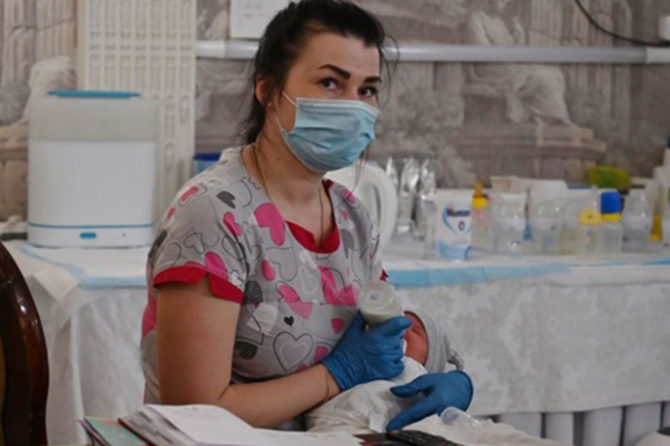
Babies born to surrogates cannot be picked up from Ukraine due to quarantine. BBC tells the story of an Argentinean couple
The quarantine deprived dozens of babies born to Ukrainian surrogate mothers of the care of their parents-citizens of other countries. Reported by Valeria Perasso, BBC Social Issues reporter.
When Argentine Flavia Lavorino decided to have a child with the help of a surrogate mother, she found Ukraine on a map and calculated the distance.
About 12,800 kilometers separate Buenos Aires from the Ukrainian capital.
She and her partner Jose Perez have been together for 15 years. The couple tried all possible methods of infertility treatment. They went through difficult and painful procedures, but Flavia got pregnant only once, and, unfortunately, unsuccessfully – she had a miscarriage.
So, when a woman heard from a colleague about an attempt to give birth to a child from a surrogate mother in Ukraine, she immediately took up the idea.
This was our last hope, – says Flavia to BBC News Mundo. “When it was confirmed that the fertilization of the Ukrainian surrogate mother was successful and the pregnancy was developing normally, we were on cloud nine,” adds Jose.
They had no way of knowing about getting stuck on the other side of the Atlantic because of a coronavirus pandemic after the birth of a child.
Their son Manuel is now seven weeks old – and the parents have not yet seen the baby.
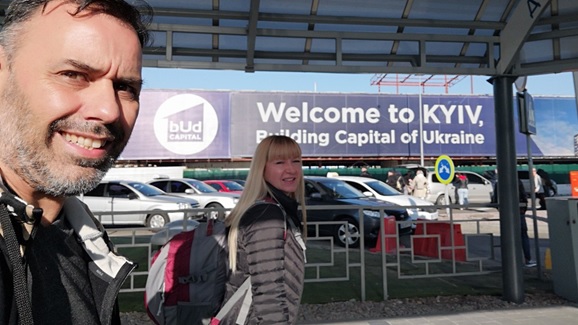
“It’s the worst nightmare. Just imagine – so long wait, and then you find out that you have to wait even longer. Without having a clear idea of when we will be allowed to travel, ” says Jose.
Ukraine, like many other countries, has closed its borders to international visitors in an attempt to limit the spread of Covid-19, which has claimed the lives of more than 300,000 people worldwide.
And dozens of babies born to Ukrainian surrogate mothers cannot get into the arms of their foreign parents.
Argentina has also banned all commercial flights until September due to global quarantine. Therefore, the couple cannot even plan a trip for the near future.
“Physical contact with parents is very important for child’s development. He has to be with us, and we need to be with him, ” says the father.
“It seemed to be impossible…”
Flavia and Jose visited Ukraine for the first time in December 2018. And four months later they came to Kyiv again for the procedure of creating an embryo using his sperm and her egg.
The embryos created in the laboratory were transferred to the uterus of a gestational carrier, or surrogate mother, which they found with the help of a local clinic.
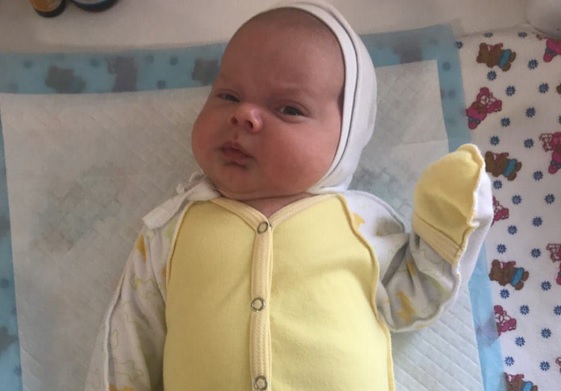
“We did not meet with our surrogate mother, all contacts were through the clinic. We do not know the details. But we know that she received a fee for her services, “says Jose.
Commercial surrogacy in Ukraine is not prohibited by law, and it is a lucrative business for locals.
The cost of services varies from 30,000 to 50,000 dollars. It is much cheaper than in the United States and other countries where surrogacy is also legal.
The couple from Argentina had to take a loan and borrow money from relatives. They do not say how much they spent, but it was “within these price limits, and probably half of the amount was received by the surrogate mother.”
“When we were confirmed in late July that fertilization was successful, we began to plan every detail. We wanted to arrive a few days before the probable due date, which the doctors scheduled for April 10,” says Flavia.
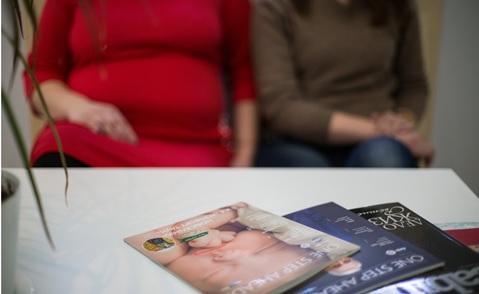
“We watched the pregnancy. The clinic was sending us copies of all the necessary tests every month, ” adds Jose.
The couple booked a flight to Kyiv on April 2, with a stopover in Madrid.
But the coronavirus ruined their plans. Spain is one of the countries most affected by the pandemic, so they had to give up travel.
“We had no idea that everything could be so bad. We thought that everything would pass, and we continued to plan the trip, even when the airports stopped working, ” says Flavia.
European countries started to close their borders, and when in mid-March it was Argentina’s turn, the couple lapsed into despair.
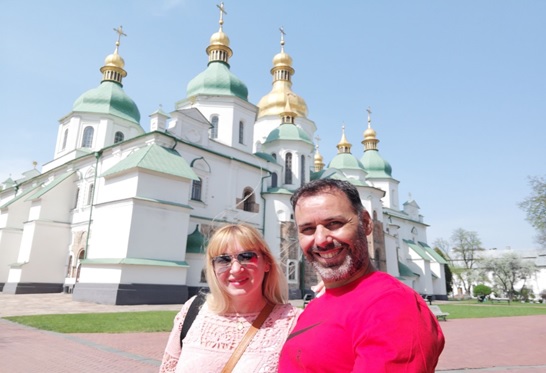
“I was shocked. We knew that the circumstances were exceptional, but we underestimated the consequences, ” says Flavia.
The situation was further complicated by the fact that the couple works in the field of health care.
Flavia is a social worker and Jose is a doctor in the intensive care unit at a hospital near Buenos Aires.
As key workers during the pandemic, they were initially denied leave. Jose treated patients with Covid-19
.
“We were constantly talking via WhatsApp with the Spanish-speaking coordinators of the clinic in Kyiv,” he says. – We were told to stay put. The clinic found a place to accommodate Manuel before his parents’ arrival.
They explained that the newborns are safe, they are taken care of, they are fed… We were reassured, at least as much as possible – just humanely, “says Jose.
Premature birth
Little Manuel was born prematurely – on March 30.
Excited parents found out about it in the morning when they were going to work.

“We had a baby, and we were 12,500 kilometers away… We had to stop the car to prevent an accident,” Flavia recalls.
Later that day, they saw for the first time a photo of their son, a healthy boy (height 52 cm, weight 3,600 kg).
“Our surrogate mother asked the clinic if she could send us a message on WhatsApp. And she wrote that she was happy during her pregnancy and that she is proud to have fulfilled our long-held dream, ”says Jose.
“We didn’t have the opportunity to meet her, but we said she made our family full and changed our lives forever,” Flavia adds.
In other countries, children born to surrogate mothers during a pandemic remain with them or with reproductive workers.
However, Flavia and Jose never thought about leaving the child with other people.
“It doesn’t matter if you are a surrogate mother, a professionally trained nanny or a nurse. Their task is to take care of the child’s health and normal development, but no one will be able to replace relatives in these crucial first weeks, says Jose. “It breaks my heart.”
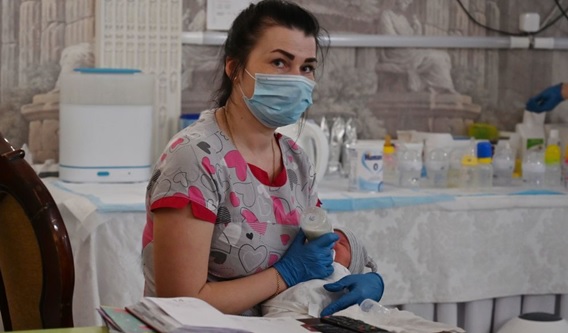
Hotel for babies
The Ukrainian clinic has made sure that the children are accommodated in a small hotel “Venice”, which is part of the clinic.
Except Manuel, there are about 50 other babies. And their number is constantly increasing, because surrogate mothers continue to give birth, and quarantine bans will not be lifted in the near future.
“We have here Chinese, Italian, Spanish, British children”, says Denis Herman, a representative of the BioTexCom Human Reproduction Center, one of the most popular surrogacy centers in Ukraine.
Biological parents usually stay in the Venice hotel when they come to Kyiv to pick up their child. Now there is a team of nurses working around the clock. They take care of children and strictly follow the rules of quarantine, say BioTexCom.
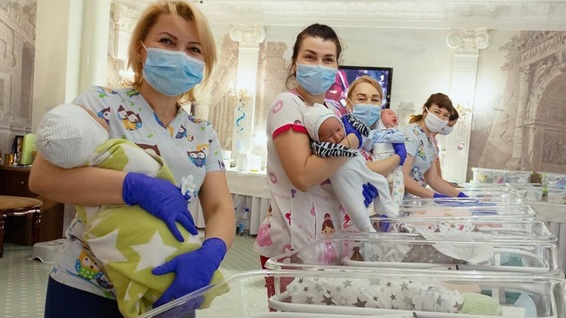
Cots stand in rows there, the name of each kid is specified on their sleeping suits by color.
“We are sorry for these children, we understand that no one will replace their parents,” said Olga Kuts, a nanny who shared her impressions with the BBC.
Jose and Flavia are constantly in touch with nurses who can speak Spanish.
“When Manuel turned one month old, we talked for a long time by video call. It was very nice of them, – says Flavia. – The nurses held Manuel in their arms for a long time, and he is heavy! Being able to talk to him and see him in real time gives a completely different feeling. ”
“But we understand that the number of children is increasing, and babysitters cannot give them as much time as parents. And that complicates the problem, ”says Jose.
Since 2015, when Asian reproductive medicine clinics began to close one after another amid allegations of possible exploitation of pregnant women, Ukraine has become one of the world’s centers of commercial surrogacy.
Relatively low prices compared to other countries, less strict regulations and active demand from foreigners – all this has led to the rapid development of Ukrainian reproductive clinics.
For many Ukrainian women, mostly from small towns or villages, surrogacy is an opportunity to earn a living. The full package of services costs about 50 thousand dollars. A surrogate mother can get less than half of this, but by Ukrainian standards even that amount is a lot of money.
Under Ukrainian law, a surrogate must be a mother herself. This reduces the likelihood that she will have strong feelings for the child she is carrying for other parents.
Quarantine has exposed a harsh truth that Ukrainian health officials seem to have ignored for too long. No one knows for sure how many children are born here every year from surrogate mothers. At least 100 children are separated from their parents during two months of quarantine.
For many infertile couples surrogacy may be the only chance to have a child. But for critics of such reproductive technologies, stunning photos of cradles with babies in a Kyiv hotel have sparked emotional controversy about so-called “children’s factories” and reproductive tourism.
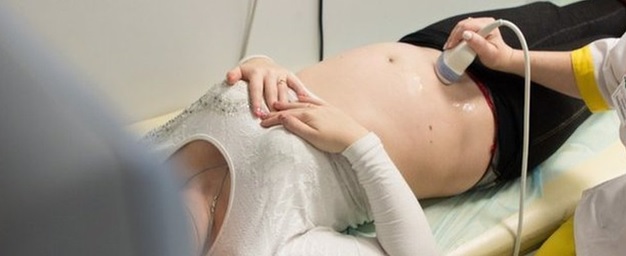
Diplomatic negotiations
Ukraine closed its borders in March.
“The government does not allow foreigners to come to Ukraine, even if they have a child here,” said Denis Herman of BioTexCom.
However, some families managed to obtain a special travel permit, and countries are trying to reach an agreement with the Ukrainian authorities through embassies and consulates.
So far, only 15 children are with their parents, including a couple from Sweden, who arrived in the Ukrainian capital by private jet. As they told the BBC, the trip was paid for by an anonymous donor.
In addition to Flavia and Jose, there are 16 more families in Argentina, who are waiting for the opportunity to come to Ukraine. They are also clients of Ukrainian surrogate mothers. Three children have already been born, the others are due to be born from the end of May to September.
Anxious parents filed a joint petition to force the Ukrainian government to respond to their request.
“We had been waiting for about 20 days, because we understand that the time is very difficult. But then we filed a legal request, ” says Jose.
However, there is some progress. Ukraine has agreed to make concessions, but asks the Argentine government to organize the flight on humanitarian grounds.
Argentines hope to get permission by the end of the month. But even upon arrival in Ukraine, they will not be able to see little Manu immediately.
“We will have to go through two weeks of self-isolation,” says Flavia. “But the main thing is the health and well-being of the child.”
The couple does not know yet when they will be able to return home – some time will be spent on paperwork for the child. And they may even have to wait until the borders are opened.
“We don’t really care when we can return home from Ukraine. We have a son who is seven weeks old and he is far away. That’s what worries us, – says Flavia – This situation has exhausted us emotionally and physically. Our only wish is for everything to end as soon as possible, and we will take care of the rest later. ”



